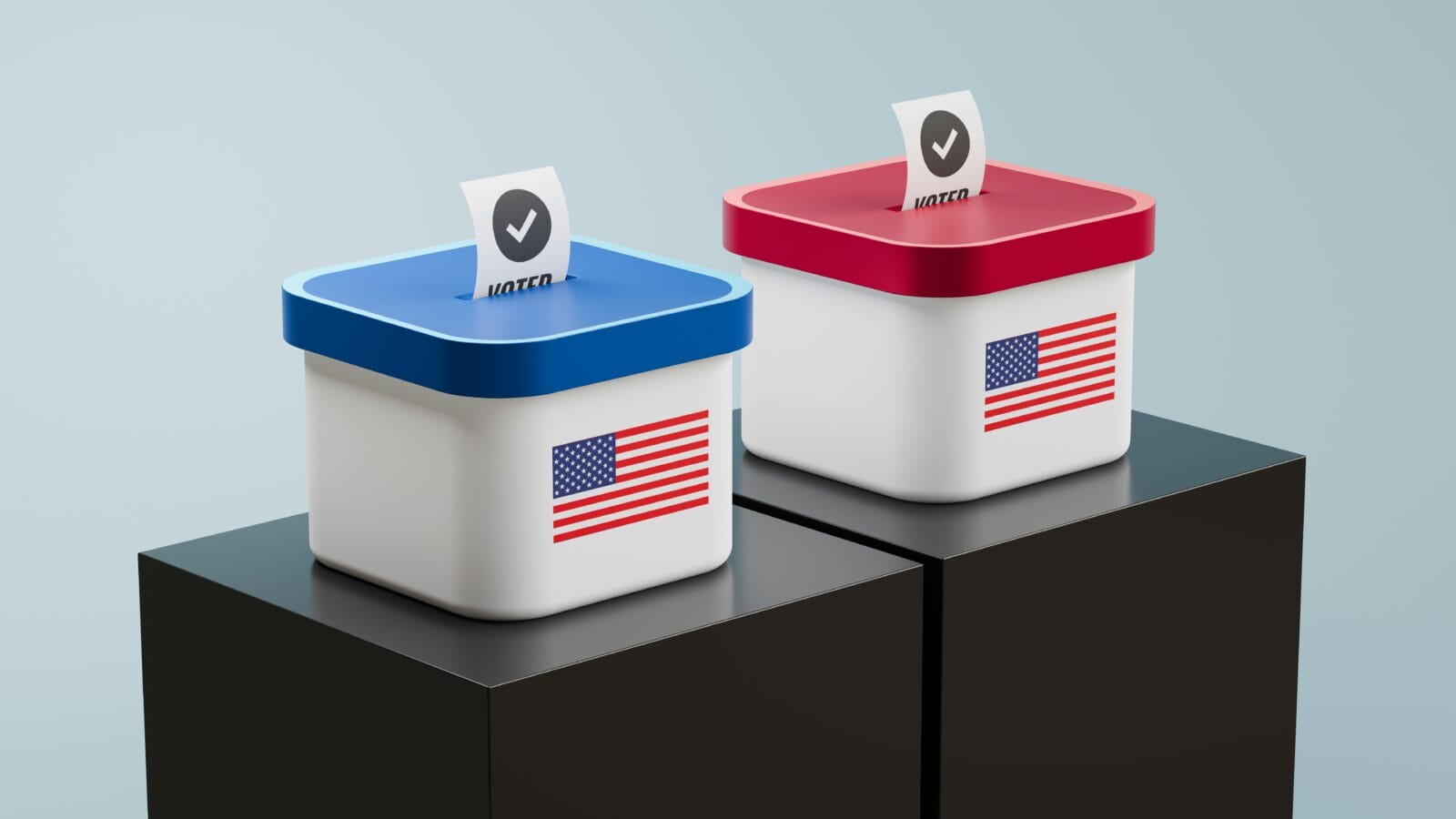Sharing her latest commentary and analysis on the U.S. Presidential Election taking place this November, PIMCO’s head of U.S. public policy, Libby Cantrill, reflects on last week’s debate and assesses what it might mean for the election and for the markets
Over the weekend, pundits continued to weigh in on the outlook for President Joe Biden’s re-election prospects following Thursday’s objectively awful debate performance. Biden not only failed to reassure swing voters that he is up for the job for another four years, but he also deflated his base and, for many, called into question whether he is up for the demands of the presidency even today.
Unsurprisingly, election prediction markets have shifted, now favoring a Trump victory as a more likely outcome. Before Thursday, our view had been that the race was effectively a coin toss, but now we would agree that – with the caveat that a lot can still happen in the remaining four months – the odds undoubtedly favor former President Trump at this point, assuming Biden stays in the race. This could also have implications for down-ballot races in both the House and the Senate, and therefore on the direction of fiscal policy as well.
On whether Biden will stay in the race, the decision is his alone, not the Democratic Party’s, not the donors’, nor the pundits’. Biden currently controls 99% of the delegates and what happens to those delegates is his decision. Of course, no candidate has ever withdrawn this late in the race; the party has planned its entire campaign around his candidacy; the mechanics of putting forth a new candidate are incredibly complicated; and there is no clear consensus alternative. All that said, while we believe the odds of Biden dropping out remain remote, they are certainly higher than they were before. If such an outcome comes to pass, we believe an announcement would be made within the next week or two.
For markets, the biggest takeaways from the debate are that deficits will remain high, the U.S. will stay hawkish on China, and tariffs are likely to go up, especially if Trump is reelected. The question is when this will be priced into markets.
A rough night for the president
In the first – and potentially last – 2024 presidential debate, President Biden not only underperformed the arguably low expectations set for him but also exacerbated what a majority of voters thought going into the night: He is simply too old to lead the country for four more years. Even during his better moments, Biden’s performance was halting, and his clearly rehearsed lines were delivered in a hushed, hoarse voice; in his worst moments, he was downright unintelligible and incoherent. It was the opposite of his presentation at the State of the Union when he was confident, relaxed, and forceful.
In contrast, former President Trump was energetic and certainly more disciplined than his ugly performance in the first 2020 debate (a very low bar, to be sure). He often pivoted to his talking points, such as immigration.Given the outcome of last week’s debate, the odds are that the Trump campaign will not agree to a second debate to avoid giving Biden an opportunity to recover. However, it remains a possibility.
What could be more interesting – and carry higher stakes now – is the vice presidential debate scheduled for late July or August (exact date and opponent to Vice President Kamala Harris yet to be determined).
There was also (some) policy talk
While debates tend to be much more about style than substance, there was some discussion on policy. For investors, we see three big takeaways:
- First, taxes got a lot of attention, previewing what will be a huge policy issue in Washington in 2025, when the Trump tax cuts are scheduled to expire. In Thursday’s debate, Trump vowed (once again) to extend the tax cuts, while Biden (in a somewhat mangled way) said he would raise taxes on the rich while keeping the tax cuts for those making less than $400,000 annually. A Republican sweep of the White House and Congress is more likely after Thursday, so the chance of a full Trump tax cut extension that is not paid for is also more likely.
- Second, there was no mention of deficit reduction or serious talk of entitlement reform, although Biden did indicate that he would support an increase in the payroll tax for those making more than $400,000. Neither candidate, nor either party, appears inclined to broach any major spending overhauls. Therefore, our view that the deficit will be the biggest loser of the election still stands, regardless of the outcome.
- Third, Trump once again doubled down on his tariff position, arguing that tariffs will reduce the deficit and be a win for America (and will not add to inflation). Since Trump’s election in 2016, we have maintained that people should take him seriously on tariffs – he has been incredibly consistent on this issue his entire adult life. (See last month’s Macro Signposts on the implications of tariffs for inflation and growth.)
What’s next for Biden’s campaign?
Although some observers speculated that the timing and format of the debate were a plan by Democrats to expose Biden’s weakness and remove him from the ticket, this is simply not reality. After all, this is not the 1960s when the party, not the voters, ultimately determined the nominee. The reality is that Biden has won 99% of pledged delegates via the state primaries. Only Biden can decide to release them to vote for another candidate. While donors, pundits, friends, and Democratic insiders may call on Biden to drop out (and many others rally to defend him), the decision is his alone – and thus far, we see no indication that he is seriously contemplating stepping down.
Hypothetically, how would it work if Biden did drop out?
To step aside, Biden would need to announce that he will not accept the Democratic nomination and that he is releasing all of his pledged delegates. While he could suggest that these delegates support another candidate, such as Vice President Harris, he cannot force them to support a specific candidate once they are released.
This would theoretically lead to an “open” or “brokered” Democratic Convention, starting on August 19. In this scenario, individuals would be nominated from the convention floor and try to convince the nearly 4,000 state delegates to support them. To secure the nomination, a candidate would need a simple majority of delegates (1,968 to be exact).
If no candidate earns the majority of votes on the first ballot, the process would go to a second ballot. This is where it could get interesting, as the so-called Super Delegates would be allowed to vote (until 2020, they could vote on the first ballot). These 739 individuals include members of Congress, governors, and senior party officials. At this stage, the party couldput its thumb on the scale to try to expedite an outcome.
In addition to the fact that Biden is unlikely to step down, there are other considerations:
- First, a change would need to occur within the next week or so. Although the convention is not until August, the Democratic National Committee has planned a roll call vote as early as mid-July.
- Second, there is no clear consensus alternative to Biden. While Vice President Harris would be the most likely nominee, in our view, she has favorability ratings that are just as bad (if not worse) than Biden’s. Although there are many up-and-coming Democratic governors, there is no clear alternative.
- Third, Democrats are trying to be the party of stability and no drama, and a contested convention would undermine that image. They are keen to avoid a repeat of the 1968 convention, which also took place in Chicago; it was marred by violence across the city and venomous speech and outrage among delegates. Then-Vice President Hubert Humphrey won the nomination, but lost the election.
Post-debate polling
Prior to Thursday’s debate,Biden and Trump were effectively tied in the polls, with Trump leading in most key swing states. While Biden’s polling has and will increasingly be hurt by the debate, the question remains: Who benefits? Will it be Trump, or a third-party candidate such as Robert F. Kennedy, Jr., who, incidentally, could qualify for the debate stage in September? This possibility might be another reason why Trump would not be interested in debating again.
Also, how will the debate affect the down-ballot races? At this point, many of the Democratic candidates running in vulnerable House and Senate races have been outperforming Biden in the polls by several points. A key question is whether that will continue or if Biden’s debate performance also affect those candidates, thereby increasing the odds of a Republican sweep come November.
While debates rarely upend races, they can and do change voters’ impressions and polling at the margins – which, in this case, could matter quite a bit.













